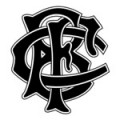|
It should be noted that 29 players from Anniesland have had the honour of representing the Baa-Baas amongst the more recent being Scott Hutton and Cammy Little
In 1988 the Barbarians came to New Anniesland and played Glasgow Accies in the Herbert Waddell Memorial match and Hawks lost to them in the Melrose Sevens a few years back
THE HERALD REPORTS
KEVIN FERRIE December 06 2007
Ignore last weekend's meaningless 22-5 defeat to the Barbarians at Twickenham, the records will show that South Africa's Jake White ended one of the great international coaching careers as a winner. His own view of the Barbarians match seemed reflected in the wholesale changes he made to the Springbok team after the official Test against Wales.
It is pretty rare these days for Twickenham to be filled to less than capacity when any major rugby match is played there so the large sections of empty seating at English rugby's HQ were significant. In this professional age, the paying public is becoming increasingly discerning and hopefully players, coaches and administrators took note.
The only argument for maintaining such traditions (anachronisms) as the BaaBaas - the name of which alone reinforces prejudices of inverted snobs who still misguidedly seek to misrepresent certain sports as only being for "posh" people - is popularity with the public. It seems that is dwindling.
I was delighted when Andy Robinson, Edinburgh's ex-England head coach, indicated he had been approached to release players for that match but would not. There were none from Glasgow either, not that it helped them avoid a rather ignominious defeat at Connacht, of which more, no doubt, over the next couple of days.
Robinson and Sean Lineen, his Glasgow counterpart, got their priorities right and Edinburgh were rewarded with a fine win at Ulster which takes them within range of achieving two of their newly announced targets, to win more than half their Magners League matches and finish in the top five.
By contrast there was something pretty distasteful about watching Martin Williams, the Cardiff Blues flanker, gambolling around Twickenham in celebration after scoring one of the Barbarians' tries as they beat the largely second-string Springboks side. Not that he was missing anything that important for his club since they were already out of the Anglo-Welsh Cup, itself a competition that badly undermines the development of rugby in the Celtic countries, detracting as it does from the Magners League. But what sticks in the craw is that Williams had withdrawn his labour from his country's cause the previous week.
I have long been uneasy about players retiring from international sport while continuing to play professionally for clubs. At best it smacks of self-indulgence, at worst egotism with personal feelings about not being able to perform at the necessary level deemed more important than the national cause when, presumably, the coaches still consider the player in question the best man for the job. That is not about tradition, it is about what matters and the hope must be that in rugby playing genuine international sport will always be paramount.
In Williams' case the problem is exacerbated because he is keeping his international successor, Robin Sowden-Taylor, out of the Cardiff team. Sowden-Taylor understandably looked off the pace when facing South Africa for Wales.
It is easy to understand why players love representing the Barbarians and why even as down-to-earth an individual as Mark Regan was prepared to defy his club Bristol's wishes to captain them. A bit of a jolly in the company of some of the world's best players, reinforcing one's own sense of self-importance away from the pressure of real professional sport. What's not to like?
Yet when, as they doubtless will again ere long, professional players' associations whinge about members being overworked they should perhaps look firstly at themselves.
Meanwhile, the Boks head home to what, in perhaps more than one sense, is the post-White era. It has become customary to dismiss talk of quotas in South African professional rugby as political correctness, but perhaps we need to consider that question in a different way.
Setting aside the disgusting atrocity that was apartheid, South Africa's black communities were subjected to a century of discrimination which not only meant they were denied the opportunity to represent their country at what was nominally the national sport, but came to see the Springbok badge as a symbol of oppression.
Two World Cup wins may have changed the aspirations of many, but the argument that so much wrong-doing should be addressed by waiting for sporting evolution to take its course is very questionable. Those seeking to force change through a revolution in their setup by ensuring that at least at provincial level teams are obliged to create role models from all sections of society are entitled to believe they have bided their time long enough.
Professional rugby must be seen to be about opportunities for all, moving away from old-school colonial values that did once blight the sport - but are as relevant to modern rugby as the Barbarians.
This article was originally posted on 6-Dec-2007, 09:08 by Hugh Barrow.
Last updated by Hugh Barrow on 6-Dec-2007, 12:59.
|








